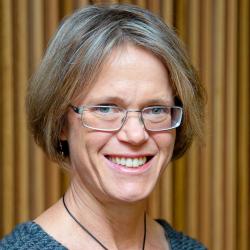
Image: Department of Industry, Science, Energy and Resources
Bachelor of Economics (1994), Bachelor of Arts (Asian Studies) (1993)
Jo Evans is currently the Deputy Secretary in the Department of Industry, Science, Energy and Resources. Jo leads the rollout of the government’s climate change policy and supports energy innovation including hydrogen, offshore wind and electric vehicles. She currently also looks after the department’s corporate teams.
She is on the Board of the Australian Renewable Energy Agency (ARENA), and works closely with the Clean Energy Finance Corporation, the Climate Change Authority, the Clean Energy Regulator and the Wind Farm Commissioner. Prior to joining the APS, she worked for management consultants McKinsey & Company.
Jo has a Masters of Public Policy from the Woodrow Wilson School of Public and International Affairs at Princeton University, a Masters in Environmental Science from the University of Melbourne and Honours degrees in Asian Studies and Economics from the ANU.
Jo’s career advice to CBE students:
How can students best prepare themselves for a career in environmental policy?
Environmental policy is not necessarily different to other policy areas unless you want to work in a technical area. For example, while I do have a Masters in Environmental Science, what I really learned from that degree was how to consider risk and how to use models of environmental issues to support advice and policy development. Policy development needs creative minds that are able to draw together evidence to develop options and support recommendations on what the best choices might be on how to proceed. Perhaps the best way to prepare for this type of work is to use your time at university to hone your problem solving skills (try to work things out yourself, do the research, work things through, find ways of checking your conclusions with people actually affected by the issue) and also work on your collaboration skills.
You moved from working in the private sector to public policy making. What advice will you give students who are unsure which sector is best for them?
I don’t think it matters where you start out. In my case I found a private sector organisation that had a strongly values based approach to its work so it felt like a good place to start. In moving to the APS, that sense of belonging was even stronger. There is a lifestyle choice involved although as time passes more and more APS positions are in cities other than Canberra, so even that choice has probably diminished over time. The one thing I would say, is seriously consider a career in the public service. The work can be very rewarding and varied and the people are great.
Top tips for ANU students aspiring to a place in a graduate program of the Public Service?
We are not looking for zealots or people with a mission or dedicated to a cause. We are looking for people who can show that they are genuinely interested in the future of Australia and have the creativity and analytical skills to find balanced, well considered solutions to really challenging issues. And if I were to put a plug in for my own department, COVID-19 has highlighted the critical work we do to support the nation’s economy and citizens. We truly are at the frontline in building a stronger economy and more jobs for Australians. I would argue, a compelling calling.
